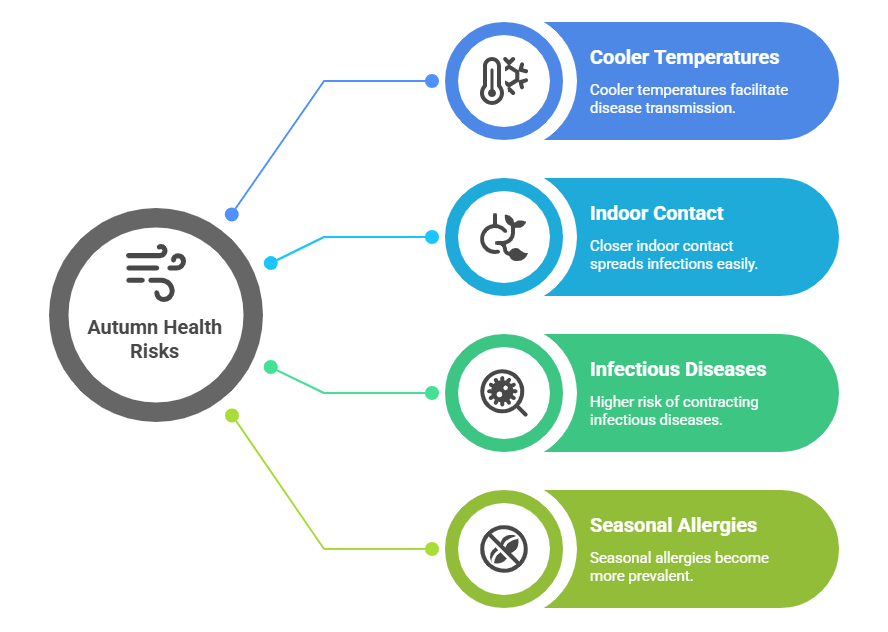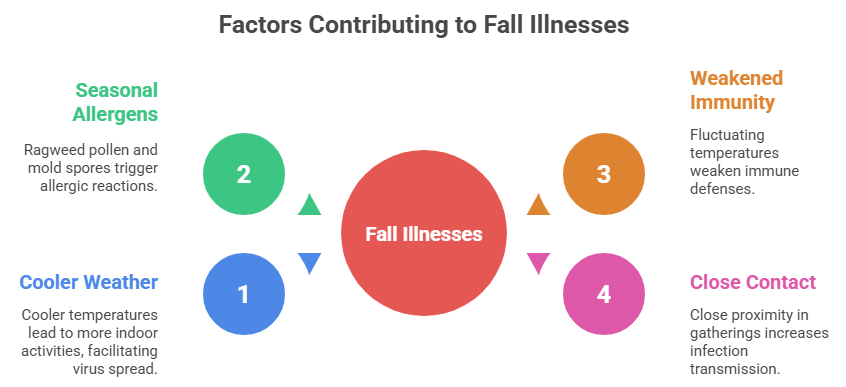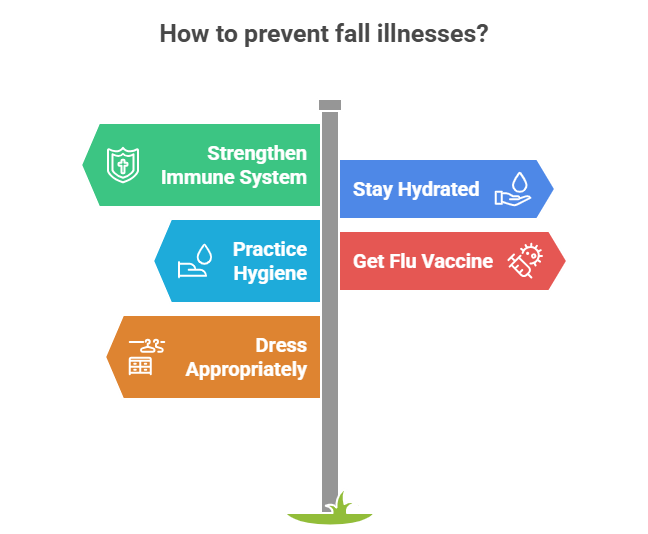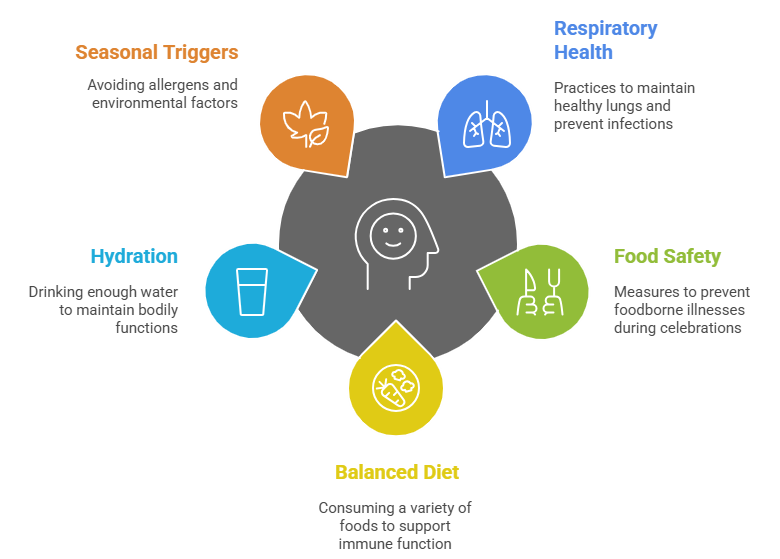


As autumn approaches, the shift in weather brings with it a well-documented increase in common illnesses. Cooler temperatures and closer indoor contact make this season conducive to the transmission of infectious diseases and the onset of seasonal allergies.
Recognizing these health risks is essential for individuals and families. A proactive approach to wellness ensures that people remain healthy and are able to fully participate in the activities and traditions that make the fall season unique.

Learn how autumn weather influences common health challenges and prevention strategies.
With cooler weather, people tend to spend more time indoors, which helps viruses like the cold and flu spread more easily. Symptoms typically include nasal congestion, sore throat, coughing, fatigue, and fever.
While the common cold tends to be mild, influenza can lead to serious complications, especially for vulnerable populations such as children, seniors, and those with chronic illnesses. Early recognition and care are critical in managing these infections.
Fall is notorious for seasonal allergies, due primarily to the high levels of ragweed pollen and mold spores from damp, fallen leaves. These allergens trigger symptoms such as sneezing, itchy and watery eyes, nasal congestion, and sinus pressure. Individuals with asthma or other respiratory conditions may experience exacerbated symptoms during this season.
Beyond colds and the flu, respiratory infections like bronchitis and pneumonia increase in frequency during fall. Fluctuating temperatures and weakened immune defenses contribute to the susceptibility of the respiratory system. Symptoms such as persistent cough, chest pain, shortness of breath, and fever warrant timely medical evaluation to prevent progression.
Gastrointestinal viral infections such as norovirus are also more common during fall. These infections spread quickly in close-contact environments causing nausea, vomiting, diarrhea, and abdominal cramps. Good hygiene and sanitation practices during gatherings help reduce transmission.

A strong immune system is your first line of defense against seasonal illnesses. Focus on a balanced diet rich in vitamin C (citrus fruits), antiviral properties (garlic), and gut health (probiotics). Regular exercise and adequate sleep contribute significantly to immune resilience.
In cooler weather, the natural thirst response may lessen, but maintaining hydration is essential. Proper fluid intake helps keep mucous membranes moist and better able to act as a barrier against viruses and bacteria.
Hand washing with soap and water remains one of the simplest and most effective methods for preventing the spread of germs. Use alcohol-based sanitizers when handwashing is not possible, and routinely disinfect frequently touched surfaces like door handles and mobile devices.
The annual influenza vaccine is strongly recommended each fall. It reduces the chance of contracting the flu and mitigates symptoms if infection occurs. Vaccination is especially important for high-risk groups, including young children, older adults, pregnant women, and individuals with chronic health conditions.
Wearing layers allows you to adjust to varying temperatures and helps maintain body warmth. Protect your head and chest with hats and scarves to minimize exposure to cold air, which can increase the risk of respiratory illness.

Preventing exposure to common fall allergens is crucial. Keep windows closed during peak pollen times, use air purifiers indoors, and regularly clean floors and surfaces to control mold and pollen levels. Avoid outdoor activities when ragweed pollen counts are high.
Over-the-counter antihistamines and nasal sprays can effectively relieve allergy symptoms. Natural options such as consuming local honey, saline nasal rinses, and steam inhalation may provide supplementary comfort.
Limit contact with individuals showing signs of respiratory infections. Practicing cough etiquette and wearing masks when necessary can prevent spread.
Engage in breathing exercises and maintain an active lifestyle to support respiratory health. Improved lung capacity and clearance mechanisms help reduce infection risk and speed up recovery.
If symptoms include persistent high fever, difficulty breathing, chest pain, or a worsening cough, promptly consult a healthcare provider to prevent complications.
Fall is a season of celebrations, which increases the risk of foodborne illnesses. Proper hand hygiene before food preparation, maintaining safe temperatures for perishable items, and avoiding cross-contamination are essential, especially for outdoor gatherings.
Seasonal sweets and comfort foods are appealing, but excessive consumption may impair immune function. Maintaining a balanced diet supports your overall health and immune defenses.

Autumn should be about crisp mornings, golden leaves, and festive gatherings, not battling coughs, colds, or allergies. With a little care like eating well, staying hydrated, and protecting yourself from seasonal triggers, you can keep illness at bay. Small daily habits go a long way in keeping you and your family healthy, so you can truly enjoy everything the fall season has to offer.
Seasonal illnesses can strike when you least expect them. Metro Urgent Care offers fast, reliable treatment for flu, allergies, and other fall health concerns, without long waits. Our experienced team is committed to keeping your family safe and healthy throughout the season.
Contact us today for trusted care close to home.
Colds, flu, seasonal allergies, respiratory infections like bronchitis, and stomach bugs are the most common illnesses people experience during the fall season.
Boost immunity with nutritious food, exercise, hydration, and rest. Practice good hygiene, get your flu shot, and dress appropriately to avoid sudden weather-related illness.
Ragweed pollen, mold spores, and dust are common fall allergens. Cooler weather and increased time indoors can trigger stronger allergy symptoms in sensitive individuals.
Stay active, eat seasonal fruits and vegetables, drink water, wash hands regularly, manage allergies, and dress in layers to adapt to changing fall temperatures.
Seek medical care if you have prolonged fever, chest pain, difficulty breathing, severe allergy symptoms, or if home remedies and rest aren’t helping.